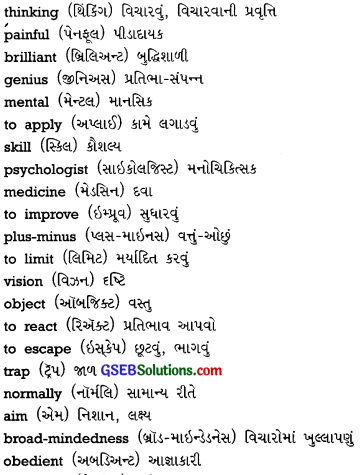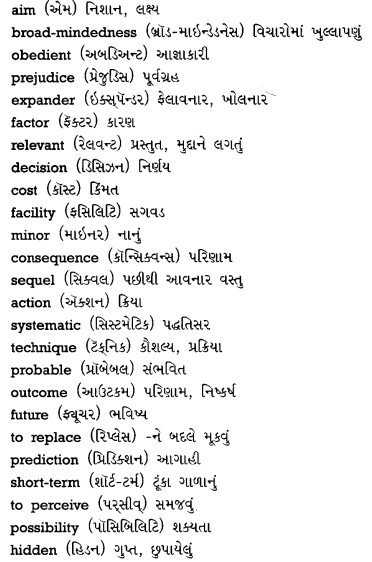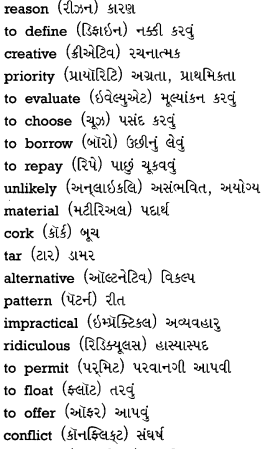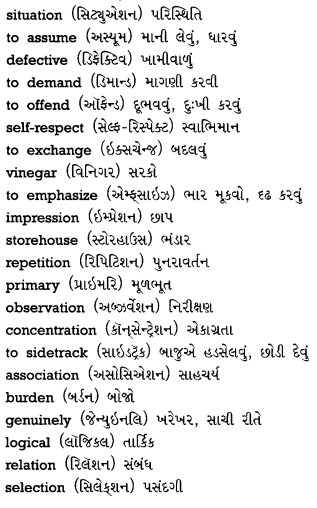Gujarat Board GSEB Solutions Class 10 English Second Language Supplementary Chapter 18 Mind PowerTextbook Exercise Questions and Answers.
GSEB Class 10 English Textbook Solutions Supplementary Chapter 18 Mind Power (Second Language)
GSEB Class 10 English Mind Power Text Book Questions and Answers
Read the passage and answer the questions.
(1) Thinking is rather a painful activity for most of the people. Many avoid thinking in their day-to-day life. We call them “dull.” Even if you are not brilliant, you can act as genius by applying right mental skills. Dr Edward de Bono, a psychologist and professor of medicine at Cambridge University, England had suggested some steps to improve thinking. He believes: Thinking skills help in solving the problems of everyday life and everyone can learn them. [Page 78]
![]()
Questions :
(1) Why do people avoid thinking ?
(2) Whom do we call ‘dull’ ?
(3) How can you act as a genius ?
(4) Who is Dr Bono ?
(5) What does Dr Bono believe ?
Answers:
(1) People avoid thinking because it is a very painful activity.
(2) People who avoid thinking in their day-to-day life are called ‘dull’.
(3) We can act as a genius by applying the right mental skills.
(4) Dr Bono is a psychologist and professor of medicine at Cambridge University, England.
(5) Dr Bono believes that thinking skills help in
solving the everyday problem and everyone can learn them.
(2) Plus-Minus, Interesting (PMI): The first step for better thinking is to see things without limiting your vision. Try this experiment. Look around the room for red objects (Don’t read further until you have done so.) Now close your eyes and ask yourself how many green objects there are. Look again. Surprised? You focused attention on red.
It kept you away from noticing things of another colours. It is the same with an idea. When most of us first hear a new idea or a new solution to a problem, we react either liking it or disliking ) it. Then we use our intelligence to support that idea. An easy way to escape this trap is to do a PMI. One normally presents his / her reaction about the idea presented immediately.
![]()
Using PMI, think about your school. Spend three minutes writing down every good point you can make about it, every bad point and every point that is neither good, nor bad but simply interesting. The aim of doing a PMI is to achieve broad-mindedness in our thinking. This saves us from becoming the obedient servant of our own prejudices. To put it another way: the PMI is an attention expander; it prevents us from seeing only red. [Pages 78 – 79]
Questions:
(1) Which is the first step for better thinking ?
(2 ) How do we react to a new idea ?
(3) What do we do to support a new idea ?
(4) How will do a PMI of your school ?
(5) What is the full form of PMI ?
(6) What is the aim of doing a PMI ?
(7) What does Bono call PMI ?
Answers :
(1) The first step for better thinking is to see things without limiting your vision.
(2) We react to a new idea by either liking it or disliking it.
(3) We use our intelligence to support that idea.
(4) To do a PMI of my school, I will spend three minutes writing down the good points, the bad points, every point that is neither good, nor bad but simply interesting.
(5) The full form of PMI is Plus-Minus, Interesting.
(6) The aim of doing a PMI is to achieve broad-mindedness in our thinking and save ourselves from becoming servants of our own prejudices.
(7) Bono calls PMI an attention expander.
![]()
(3) Consequences & Sequel (C&S): We differ from animals in our ability to imagine the results of our actions. We can greatly improve this ability by learning to use it in a systematic way. The de Bono technique is to imagine the probable outcome of a decision at four distances in the future: immediate, short term (1 to 5 years), medium term
(5 to 25) and long term (over 25 years).
Alternative, Possibilities, Choices (APC):
Edison, in searching for a light-bulb filament ‘ tried thousands of unlikely materials, including cork, fishing line and tar. The key to finding alternatives is to look for possibilities, outside your usual thinking pattern. Learn to “think wild.” Let yourself imagine all kinds of possibilities, including those which look impractical or ridiculous. Permit your mind to float free and to take what if offers.
Other’s Point of View (OPV) : A problem normally generates out of conflicts with others. You will better be able to find a solution if you try to look at the situation from the others point of view. [Pages 79 – 80]
Questions :
(1) How do we differ from animals ?
(2) What is the de Bono technique ?
(3) What is the key to finding alternatives ?
(4) ‘Learn to think wild.’ How ?
(5) When does a problem generate ?
(6) How can you find a solution to a problem ?
Answers :
(1) We differ from animals in our ability to imagine the results of our actions.
(2) The de Bono technique is to imagine the probable outcome of a decision at four distances in the future : immediate, short term, medium term and long term.
(3) The key to finding alternatives is to look for possibilities, outside your usual thinking pattern.
(4) You can learn to think wild by letting yourself imagine all kinds of possibilities, including those which are impractical or ridiculous.
(5) A problem normally generates out of conflicts with others.
(6) We can find a solution if we look at the situation from the other’s point of view.
(4) Repetition : Repetition is a primary but least interesting method of memorizing. You can learn and remember almost anything if you have the patience to repeat it often enough.
Involving Senses : Bringing as many of your senses as possible helps in memorization. If you see an apple, you would carry a certain impression of it, but if you lift it, smell it, taste it, you can create a clear and more lasting memory.
Power of Attention : Use your power of observation, concentration and attention. Attention means sidetracking everything except the thought or experience you want to remember. [Page 81]
![]()
Questions :
(1) What does the author say about repetition ?
(2) How can you learn and remember anything ?
(3) What helps in memorization ?
(4) Which power should you use to remember ?
(5) What is attention ?
Answers :
The author says that repetition is a primary but the least interesting method of memorizing.
We can learn and remember anything if we have the patience to repeat it often enough.
Bringing as many of your senses as possible helps in memorization. We should use the power of observation, concentration and attention to remember. Attention means sidetracking everything except the thought or experience you want to remember.
(5) Interest: If you are genuinely interested in the subject you will never forget it. Try to develop deep interest in the subjects or situations, you want to remember.
Understanding : If you do not understand a subject or situation, you cannot be expected to remember it. You must know the logical relations between all the given facts.
Selection : No one can remember everything so select things which are important for you to remember. Many people try to remember telephone numbers. But it is wiser to save the mental energy for more important work. [Page 81]
Questions :
(1) What should you do to remember a subject or a situation?
(2) Which things should you select ?
(3) What is wise thing to do ?
(4) Why can’t you remember a subject or a situation ?
(5) What must you know to remember a subject or a situation ?
Answers :
(1) We should try to develop deep interest in a subject or a situation that we want to remember.
(2) We should select only those things which are important for us to remember.
(3) Saving our mental energy for more important work is a wise thing to do.
(4) We cannot remember a subject or a situation because we do not understand it.
(5) To remember a subject or a situation, we must know the logical relations between all the facts.
Vocabulary Recognition
Select the word having the nearest meaning.
Question 1.
brilliant
A. boastful
B. showy
C. dull
D. intelligent
Answer:
D. intelligent
![]()
Question 2.
apply
A. use
B. make
C. produce
D. attend
Answer:
A. use
Question 3.
skill
A. stability
B. talent
C. nature
D. gift
Answer:
B. talent
Question 4.
improve
A. make bad
B. make equal
C. make better
D. make worse
Answer:
C. make better
Question 5.
object
A. statement
B. offer
C. aim
D. thing
Answer:
D. thing
![]()
Question 6.
react
A. recollect
B. remember
C. respond
D. recall
Answer:
C. respond
Question 7.
escape
A. run into
B. run away
C. run for
D. run towards
Answer:
B. run away
Question 8.
factor
A. cause
B. result
C. outcome
D. consequence
Answer:
A. cause
Question 9.
minor
A. huge
B. average
C. small
D. big
Answer:
C. small
Question 10.
consequence
A. score
B. cause
C. reason
D. outcome
Answer:
D. outcome
Question 11.
technique
A. gift
B. logic
C. skill
D. technology
Answer:
C. skill
Question 12.
probable
A. possible
B. impossible
C. able
D. unable
Answer:
A. possible
Question 13.
prediction
A. statement
B. announcement
C. forecast
D. declaration
Answer:
C. forecast
Question 14.
perceive
A. misunderstand
B. understand
C. perform
D. conform
Answer:
B. understand
![]()
Question 15.
evaluate
A. assess
B. raise
C. lift
D. fail
Answer:
A. assess
Question 16.
choose
A. offer
B. attend
C. give
D. select
Answer:
D. select
Question 17.
alternative
A. attentive
B. competitive
C. option
D. repetitive
Answer:
C. option
Question 18.
ridiculous
A. silly
B. serious
C. sober
D. genuine
Answer:
A. silly
Question 19.
permit
A. legal
B. allow
C. challenge
D. question
Answer:
B. allow
Question 20.
conflict
A. agreement
B. respect
C. clash
D. confidence
Answer:
C. clash
Question 21.
assume
A. appear
B. dress
C. guess
D. wear
Answer:
C. guess
![]()
Question 22.
offend
A. hurt
B. offer
C. append
D. add
Answer:
A. hurt
Question 23.
emphasize
A. load
B. stress
C. burden
D. lend
Answer:
B. stress
Question 24.
primary
A. tiny
B. small
C. secondary
D. main
Answer:
D. main
Question 25.
burden
A. money
B. loan
C. load
D. bag
Answer:
C. load
Question 26.
genuinely
A. faithfully
B. truly
C. rightly
D. wrongly
Answer:
B. truly
![]()
Information Please Summary in Gujarati
ભાષાંતર મોટા ભાગના લોકો માટે વિચારવાની પ્રવૃત્તિ પીડાદાયક હોય છે. કેટલાક લોકો તેમના દૈનિક જીવનમાં વિચારવાનું ટાળે છે. આપણે તેમને ‘નિરુત્સાહી’ કહીએ છીએ. તમે બુદ્ધિશાળી ના હો તોપણ યોગ્ય માનસિક કૌશલ્યોનો ઉપયોગ કરી એક પ્રતિભા સંપન્ન વ્યક્તિ તરીકેની ભૂમિકા ભજવી શકો. ઇંગ્લેન્ડની કેમ્બ્રિજ યુનિવર્સિટીના મેડિસિન્સના પ્રાધ્યાપક અને મનોચિકિત્સક ડૉ. ઍડવર્ડ ડી બોનોએ તમારી વિચારવાની શક્તિ સુધારવા માટે કેટલાંક ચરણો સૂચવ્યાં હતાં. તેઓ માને છે કે : દૈનિક જીવનમાં કેટલીક સમસ્યાઓ ઉકેલવામાં વિચાર કૌશલ્યો ઉપયોગી થાય છે – અને દરેક જણ તે કેળવી શકે.” તેમણે સૂચવેલાં સાત ચરણો અહીં આપ્યાં છે.
વિચાર કૌશલ્ય સુધારવાનાં સાત ચરણો:
(1) Plus-Minus, Interesting (PMI): તમારી દષ્ટિને સીમિત કર્યા વિના પરિસ્થિતિને સમજવી, એ સારી રીતે વિચારવાનું પહેલું ચરણ છે. આ પ્રયોગ કરી જુઓ. રૂમમાં આસપાસ લાલ વસ્તુઓ જુઓ, (આટલું કર્યા સિવાય આગળ વાંચવું નહિ.) હવે તમારી આંખો બંધ કરો અને સ્વાગત પૂછો કે અહીં લીલા રંગની કેટલી વસ્તુઓ છે.
ફરી વાર જુઓ. આશ્ચર્ય થયું? તમે લાલ (વસ્તુઓ) પર ધ્યાન કેન્દ્રિત કર્યું. તેથી તમે બીજા રંગોની વસ્તુઓનો વિચાર કર્યો નહિ, વિચારનું પણ એવું જ છે. આપણામાંના ઘણાખરા જ્યારે કોઈ નવા વિચાર કે સમસ્યાના નવા સમાધાન વિશે સાંભળીએ છીએ, ત્યારે આપણો પહેલો પ્રતિભાવ તે ગમે છે કે નથી ગમતો તે હોય છે. પછી તે વિચારને પુષ્ટિ આપવા આપણે બુદ્ધિનો ઉપયોગ કરીએ છીએ.
![]()
આ જાળમાંથી છૂટવાનો સહેલો માર્ગ PMા કરવામાં છે. એકાએક રજૂ થયેલા વિચાર વિશે સામાન્ય રીતે કોઈ પોતાનો પ્રતિભાવ આપે છે. PMાનો ઉપયોગ કરી તમારી સ્કૂલ વિશે વિચારો. તેમાં દરેક સારા-નરસા ગુણ તેમજ જે ગુણો સારા-નરસા નથી પણ રસપ્રદ છે તેવા ગુણોની યાદી કરવામાં ત્રણેક મિનિટ લો.
PMાનો હેતુ આપણા વિચારોને ખુલ્લા કરી તેને વિશાળ પરિપ્રેક્ષ્યમાં મૂકવાનો છે. તે આપણને આપણા પોતાના પૂર્વગ્રહોનાં બંધનમાંથી મુક્ત કરે છે. એ જ વાતને બીજી રીતે મૂકીએ તો : PMI (આપણી) દષ્ટિનો વ્યાપ વિસ્તાર છે; માત્ર લાલ વસ્તુઓ જ જોવામાંથી આપણને ઉગારે છે.
(2) Considering All Factors (CAF):
કોઈ પણ નિર્ણય કરવામાં તમામ સંબંધિત પરિસ્થિતિ વિશે વિચાર કરવામાં આ ચરણનો ઉપયોગ થાય. ધારી લો કે તમે નવી સ્કૂલ-બૅગ ખરીદવાનું વિચારો છો ? CAનો ઉપયોગ કરી કદ, કિમત, સગવડ અને એવી બીજી ગૌણ ચીજો જેવી કે તેના પરનાં સ્ટિકર્સ, ઝિપ(બંધ કરવાની ચેઇન)ના રંગો વગેરેનો વિચાર કરો.
(3) Consequences & Sequel (C&S):
આપણી ક્રિયાઓનાં પરિણામોની કલ્પના કરવાની આપણી ક્ષમતામાં આપણે પ્રાણીઓથી જુદાં પડીએ છીએ. (આ ક્ષમતાનો) પદ્ધતિસરનો ઉપયોગ કરવાનું શીખીને આપણી ક્ષમતાને આપણે સારી રીતે સુધારી શકીએ. 2 બોનોની ટેનિક પ્રમાણે કોઈ પણ નિર્ણયના સંભવિત પરિણામની ધારણા ભવિષ્યના ચાર અલગ અલગ સમયમાં કરવાની હોય છે.
તાત્કાલિક અને ટૂંક સમય (1થી 5 વર્ષો), મધ્યમ સમય (5થી 25) અને લાંબો સમય (25 વર્ષ ઉપર) આ બનો સ્વગત પૂછો : “દુનિયામાંથી તેલ ખલાસ થઈ જાય તો? અથવા કારખાનામાં કામદારોનું સ્થાન વીજાણુ રોબૉટ લઈ લે તો?પરિણામોની કલ્પના કરો.
તાત્કાલિક અને ટૂંકા સમયગાળાની અસર પરની તમારી આગાહી જોઈ તમને આશ્ચર્ય થાય છે? હવે લાંબા સમયગાળાની સંભાવનાઓની કલ્પના કરી જુઓ, થોડા જ વખતમાં તમે તમારા જીવનમાં નિર્ણયો લેવાની પદ્ધતિનો ઉપયોગ કરતાં શીખી જશો.
(4) Aims, Goals, Objectives (AGO):
અમુક વસ્તુ તમે શા માટે કરો છો તેના પર તમે કદી વિચાર કરો છો? ઘણી વાર આપણાં ધ્યેયો છૂપાં અથવા જેના વિશે વિચાર્યું ના હોય તેવા હોય છે. અમુક ચોક્કસ વસ્તુઓ કરવાનાં કારણોની યાદી બનાવવાની ટેવ પાડો. જો તમે તમારા ધ્યેયો નક્કી કરો તો તેઓ તમને સમસ્યાના રચનાત્મક ઉકેલ તરફ લઈ જશે.
![]()
(4) Aims, Goals, Objectives (AGO):
અમુક વસ્તુ તમે શા માટે કરો છો તેના પર તમે કદી વિચાર કરો છો? ઘણી વાર આપણાં ધ્યેયો છૂપાં અથવા જેના વિશે વિચાર્યું ના હોય તેવા હોય છે. અમુક ચોક્કસ વસ્તુઓ કરવાનાં કારણોની યાદી બનાવવાની ટેવ પાડો. જો તમે તમારા ધ્યેયો નક્કી કરો તો તેઓ તમને સમસ્યાના રચનાત્મક ઉકેલ તરફ લઈ જશે.
(5) First Important Priorities (FIP) :
ચરણ 1થી 4માં તમે વિચારેલી વિવિધ સંભાવનાઓનું મૂલ્યાંકન કરી પસંદગી કરવામાં આ ચરણ ઉપયોગી થશે. માની લો કે કોઈ તમારી પાસેથી પૈસા ઉછીના લેવા માગે છે. બધાં પાસાંનો વિચાર કરી ત્રણ મહત્ત્વનાં પાસાને પસંદ કરો. પહેલી પ્રાથમિકતા આ હોવી જોઈએ : “તે (પૈસા) ક્યારે પાછા ચૂકવાશે?, “ઉછીના લેનાર પર તમે વિશ્વાસ રાખી શકો?”, “પૈસા તેને શા માટે જોઈએ છે?” મહત્ત્વના પાસાને ઓળખી કાઢી તેના પર વિચાર કરો.
(6) Alternative, Possibilities, Choices (APC) :
એડિસને વીજળીના બલ્બના ફિલામેન્ટની શોધ કરવામાં બૂચ, માછલી પકડવાનો તાર અને ડામર સહિત હજારો અનપેક્ષિત પદાર્થોને અજમાવી જોયેલા. તમારી સામાન્ય વિચાર કરવાની પદ્ધતિના ક્ષેત્ર બહાર સંભાવનાઓ શોધવી એ વિકલ્પો શોધવાની ચાવી છે. “સાહસિક રીતે” વિચારતાં શીખો. અવ્યવહારુ અથવા હાસ્યાસ્પદ લાગતી સંભાવનાઓ સહિત દરેક પ્રકારની સંભાવનાઓની કલ્પના કરો. તમારા મનને મુક્તપણે વિહરવા દો અને તે જે આપે તે સ્વીકારી લો.
(7) Other’s Point of View (OPV): બીજા સાથેના સંઘર્ષથી સમસ્યાઓ સર્જાય છે. બીજાની દૃષ્ટિએ તમે પરિસ્થિતિ સમજવાનો પ્રયત્ન કરશો તો તમે તેનો ઉકેલ સારી રીતે શોધી શકશો. ધારી લો કે તમે એક વેપારી પાસેથી મોબાઇલ ખરીદો છો. આ વેપારીએ જાતે જ કોઈ એક ચોક્કસ મૉડલ ખરીદવા તમને સૂચવ્યું. ગમે તેમ પણ તે બરાબર ચાલતું નથી. તમે બે વસ્તુ કરી શકો : તમે એ ખામીવાળું મૉડલ પાછું આપી તમારા પૈસા પાછા આપવા માગણી કરો અથવા તમે તમારી જાતને તેની જગાએ મૂકો.
જો તમે પૈસા માગશો તો વેપારીને દુઃખ થશે. પણ તમે જો તેનું સ્વાભિમાનને અસર પહોંચાડી શકો તો શક્ય છે કે તે કિંમતનો તફાવત લીધાં સિવાય તમને એક વધુ સારો મોબાઇલ બદલામાં આપશે. તમે કહેવત તો સાંભળી હશે કે; “સરકા કરતાં મધથી તમે વધુ માખી
![]()
યાદશક્તિ સુધારવાની સાત રીતો યાદશક્તિ સુધારી શકાય કે…? અલબત્ત, હા. સામાન્ય બુદ્ધિ ધરાવતી કોઈ પણ વ્યક્તિ યાદશક્તિ સુધારી શકે. યાદશક્તિ સુધારવી એટલે આપણને જીવનમાં થયેલા અનુભવોની છાપ દઢ કરવી. તમારી છાપ જેટલી સ્પષ્ટ અને તમારો માનસિક ભંડાર જેટલો સુઘડ હશે, તેટલું યાદ રાખવું સરળ હશે. આ છે તેનાં સાત પગલાં.
(1) પુનરાવર્તન :
પુનરાવર્તન એ યાદ કરવાની મૂળભૂત પણ સૌથી ઓછી રસપ્રદ રીત છે. તમારામાં વારંવાર પુનરાવર્તન કરવાની ધીરજ હોય તો તમે કંઈ પણ શીખી શકો અને તેને યાદ રાખી શકો.
(2) જ્ઞાનેન્દ્રિયોનો ઉપયોગ
શક્ય તેટલી વધુ જ્ઞાનેન્દ્રિયોનો ઉપયોગ તમને યાદ કરવામાં મદદરૂપ થશે. જો તમે એક સફરજન જુઓ તો (તમારા મનમાં) તેની એક છાપ પડશે, પણ જો તમે તેને પકડો, સુંઘો, ચાખો તો તમે એક સ્પષ્ટ અને વધુ લાંબા સમય સુધી ટકી શકે તેવી યાદ ઊભી કરી શકો.
(3) ધ્યાનની શક્તિઃ
તમારી નિરીક્ષણ શક્તિ, એકાગ્રતા અને ધ્યાનની શક્તિનો ઉપયોગ કરો. તમે જે વિચાર કે અનુભવને યાદ રાખવા માગો છો તે સિવાયનું બધું જ છોડી દેવું એટલે ધ્યાન. ધારો કે કોઈ તમને તેનું નામ અને સરનામું કહે છે: મોહન, 2 ગાંધી રોડ. અહીં સ્પષ્ટ સાહચર્ય આ રીતે સ્થાપિત કરી
(4) શકાય : મોહનદાસ કરમચંદ ગાંધી – જન્મ તારીખ 2 ઑક્ટોબર. દરેકના મનમાં એવી ઘણી માહિતી (હકીક્તો) હોય છે જેની સાથે એ સાહચર્ય દ્વારા નવી હકીકતો જોડી શકે છે. પણ યાદ રાખો, જેટલાં સરળ આપણાં સાહચર્યો તેટલો ઓછો બોજો આપણી યાદશક્તિ પર પડશે.
(5) રસ :
જો તમને વિષયમાં ખરેખર રસ હોય તો તમે તે કદી ભૂલશો નહિ. તમે યાદ રાખવા માગતા હો તેવા વિષયો અથવા પરિસ્થિતિઓમાં ઊંડો રસ કેળવવાનો પ્રયત્ન કરો.
(6) સમજણ :
તમને કોઈ પરિસ્થિતિ કે વિષય સમજાય નહિ તો તમે તે યાદ રાખી શકો તેવી અપેક્ષા રખાય નહિ. આપેલી તમામ માહિતી સહકીકતો) વચ્ચે તાર્કિક સંબંધો જાણવા જરૂરી છે.
![]()
(7) પસંદગી:
કોઈ વ્યક્તિ બધું યાદ રાખી શકતી નથી. તમારા માટે યાદ રાખવા જેવી મહત્ત્વની વસ્તુઓની પસંદગી કરો. ઘણા લોકો ટેલિફોન નંબર યાદ રાખવા પ્રયત્ન કરે છે. પણ તમારી માનસિક શક્તિ વધુ મહત્ત્વના કામ માટે બચાવવી તે વધુ ડહાપણભર્યું છે. હું વિચારું છું માટે મારું અસ્તિત્વ છે. તે.
Word Meanings:




Phrases

